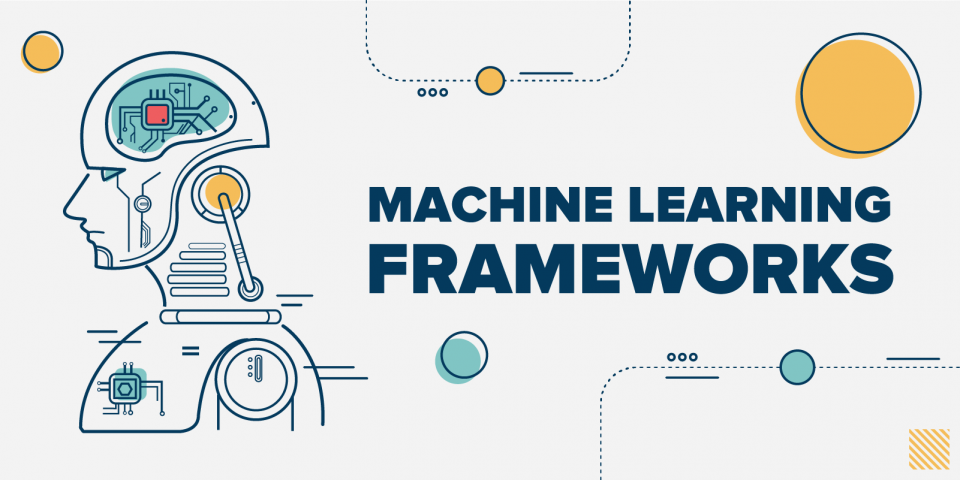The world of technology is witnessing a massive adoption of machine learning across various industries. Since 2020, there has been a significant surge in the evolution of machine learning and its job market. Companies these days leverage several machine learning frameworks to reduce the deployment time significantly. In this article, you will know about the top five machine learning frameworks you can use for training your machine learning models.
What are Machine Learning frameworks?
ML Frameworks are libraries developed by different communities and organizations that aid developers build machine learning algorithms and ML-based apps without employing core coding concepts. Companies and communities develop these frameworks with a definite intention and purpose. These frameworks help in solving various business problems and reduce time-to-market for the intended project. So, without further ado, let us take a look at the top five machine learning frameworks.
5 Machine Learning Frameworks to Use in 2021
i. Scikit Learn: It is a popular machine learning framework that developers use as a library for analyzing data and developing machine learning algorithms. David Cournapeau developed this general-purpose framework using Python under the BSD license for further distribution. This learner-friendly framework is open-source, and anyone can download it for free. Scikit Learn runs on top of other popular Python libraries and packages like SciPy, NumPy, and Matplotlib. This framework acts as a simple yet efficient toolkit for machine learning algorithms and data mining. Scikit Learn uses operations like pre-processing, clustering, classifications, dimensional reduction, regression, and model selection for designing ML algorithms. For ML projects, this framework is suitable for creating unsupervised algorithms, mining large datasets, statistical modeling, and managing computations. Well-known firms and organizations that are using Scikit Learn for their ML projects are:
· Dataiku
· Spotify
· Aweber
· DataRobot
· JP Morgan
· OkCupid
· Booking.com
· Evernote, and many more
ii. TensorFlow: Google developed this popular and robust machine learning framework. Google used it initially for their internal use and later publicly released it as an open-source framework in November 2015 under Apache 2.0 license. This freely available framework comes with APIs for developers to create and prepare ML models. It has a rich collection of libraries with a comprehensive and manageable set of tools and methods that help researchers and ML scientists develop ML-powered projects quickly. This framework is known for its powerful capabilities, allowing training models like convolutional neural networks, recurrent neural networks, linear regression, structured data classification, image segmentation, etc., with millions of parameters. Using TensorFlow, developers can process data branches (tensors) with a series of algorithms on a single flow, and hence the name. Flow is nothing but the movement of the data on the algorithm or system. Intuitive projects and APIs like image recognition, speech analysis, text recognition, and self-driving cars leverage this machine learning framework. Well-known firms and organizations that are using TensorFlow for their ML projects are:
· Walmart
· Capital One
· Box
· Intuit
· Tesla
· Virgin Hyperloop,
· Airbnb
· Qualcomm
· GE Healthcare
· Coca Cola
· Swisscom
· Lenovo, and many more
iii. H2O: It is another scalable open-source machine learning framework that helps in performing classification tasks. It is compatible with languages like Java, Python, R, and Scala. It helps organizations achieve decision support systems for machine learning projects and acts as the best solution to assemble data, create models, and render predictions. H2O can coherently blend with big data projects and technologies like Spark and Hadoop. It makes data collection easy, and since it is extensible and adaptable, developers can perform data alteration or customize its algorithm as per preference. H2O has three different versions. The current version is H2O-3 that is an in-memory platform supporting sharable and scalable ML development. H2O makes deriving data insights easier from a large volume of data and helps in delivering precise predictive models. Firms that use the H2O framework for their machine learning projects are:
· Unitedhealth Group
· Capital One
· Tech Mahindra
· PayPal
· Macy’s
· Amanda Health
· Booking.com
· Stanley Black & Decker
· Zurich insurance
iv. PyTorch: PyTorch is another Python-centric machine learning framework developed on top of Torch and Caffe2. It comes with a great collection of options to optimize the ML algorithm. It is flexible, customizable, and implements robust GPU acceleration for tensor computation. Facebook AI Research (FAIR) developed PyTorch in the year 2018. Soon, this machine learning framework became the head-first competitor of TensorFlow. Researchers and ML developers use this framework for developing applications that require time sequence prediction, image-based training & classification, language modeling, and word-based language processing. This framework also supports a dynamic computation graph that is best for linguistic analysis. It is one of the most well-accepted frameworks in the ML research community. PyTorch can run both on CPU & GPU and is compatible with libraries like Cython, NumPy, and Numba. Companies that use the PyTorch framework for their machine learning projects are:
· Microsoft
· NVIDIA
· Stanford
· Salesforce
· Airbnb
· Apple
· UDACITY
· OpenAI
v. Apache MXNET: Apache MXNET is another efficient ML framework that also aids in developing neural network applications. This lightweight framework was created as a joint project of Apache, Intel, and the open-source community. It helps in the rapid development of ML projects, supports flexible programming paradigms and languages like Python, R, Scala, JavaScript, C++, Go, and many more. This portable framework is scalable to multiple GPUs and enjoys extensive community support. Its rich modules and robust tools enable researchers and ML developers to build natural language processing and time-series-based ML projects. This framework integrates deeply with Python and supports distributed training. Companies that use the Apache MXNET framework for their machine learning projects are:
· Samsung
· Amazon
· NVIDIA
· ByteDance
· CMU
· Vanguard
· Acer
· MediaNet
Machine learning has set a new horizon in the domain of automation systems. Although machine learning is not a new technique, few factors have contributed to its exponential growth. Amongst them, one is the machine learning framework and its continuous community support. There are various machine learning frameworks in the market, and choosing which framework to use depends entirely on the project demand, language compatibility, and scope. Also, with the increase in the maturity of the framework & community or corporate support, developers choose which framework to use. Almost every vertical leverage machine learning algorithms to bring more machines to perform repetitive tasks without human intervention.










